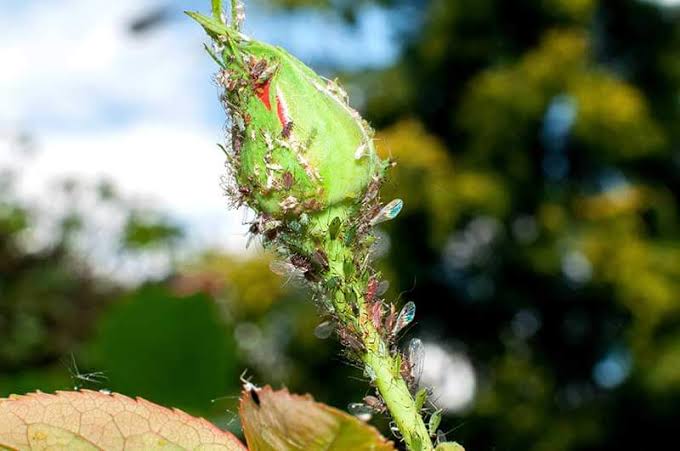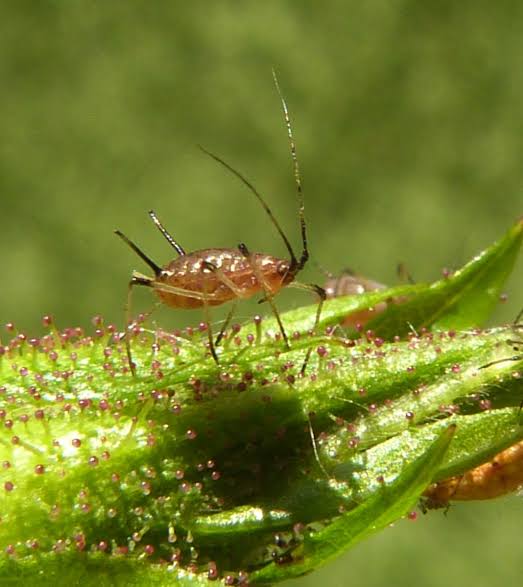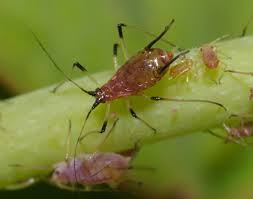The Rose Aphid, scientifically known as Macrosiphum rosae, is a tiny insect that can have a big impact on rose plants. These small, soft-bodied insects belong to the aphid family and are commonly found on roses around the world.
These little pests may seem insignificant, but their feeding habits can cause significant harm to rose plants. Rose aphids are known for using their piercing-sucking mouthparts to extract sap from the tender parts of rose plants, such as buds, stems, and leaves. As they feed, they secrete a sticky substance called honeydew, which can attract ants and create an environment for the growth of sooty mold.
One of the interesting features of Rose Aphids is their ability to reproduce rapidly. Female aphids can give birth to live nymphs without the need for mating, and this can lead to a quick increase in their population. This rapid reproduction is one reason why controlling aphids is crucial to maintaining the health of rose plants.
Despite their pesky nature, Rose Aphids have natural enemies. Ladybugs, lacewings, and parasitic wasps are among the beneficial insects that feed on aphids, helping to keep their populations in check. Additionally, some gardeners use organic methods such as neem oil or insecticidal soap to control aphid infestations without harming beneficial insects.
Regular monitoring of rose plants is essential to detect aphid infestations early. Signs of infestation include curled or distorted leaves, yellowing of leaves, and the presence of the aphids themselves. Prompt action can prevent the aphids from causing extensive damage to the rose plants.
Cultivating a healthy and balanced garden ecosystem is crucial in managing Rose Aphids. Avoiding the overuse of chemical pesticides helps to preserve the natural predators of aphids. Planting companion plants that attract beneficial insects can also contribute to creating a more resilient garden environment.
While Rose Aphids may be small, their impact on rose plants can be significant. Understanding their life cycle, feeding habits, and natural predators is essential for effective pest management. By adopting sustainable gardening practices, gardeners can maintain the beauty of their rose plants while promoting a thriving and harmonious ecosystem.
Read Also: Rambutans: History, Nutrition, Health Benefits and Growing Guide
Plants Affected by Rose Aphid

The Rose Aphid (Macrosiphum rosae) primarily affects rose plants (Rosa spp.). These tiny insects target various parts of the rose plant, including buds, stems, and leaves. As they feed on the sap of the plant, they can cause damage such as curled or distorted leaves and yellowing.
The presence of Rose Aphids can be particularly concerning for gardeners who wish to cultivate healthy and vibrant rose gardens, as these pests have the potential to harm the overall well-being of the plants. Monitoring and timely intervention are key to preventing extensive damage to rose plants caused by Rose Aphid infestations.
Furthermore, Rose Aphids not only directly harm the rose plants through their feeding activities but also indirectly impact the overall garden ecosystem. As these aphids feed, they secrete a sweet, sticky substance known as honeydew. This honeydew attracts ants, which may interfere with the natural balance of the garden.
In addition to the potential for attracting ants, the honeydew produced by Rose Aphids can create conditions suitable for the growth of sooty mold. Sooty mold is a dark fungus that forms on the surfaces of leaves and other plant parts, often leading to a black, unsightly appearance. While sooty mold itself does not directly harm the roses, it can block sunlight, inhibiting photosynthesis and potentially weakening the plants over time.
The relationship between Rose Aphids and the roses they infest is intricate and interconnected. The health of the rose plant is not only influenced by direct damage from aphid feeding but also by the cascading effects of honeydew secretion and the subsequent growth of sooty mold. This complexity underscores the importance of addressing Rose Aphid infestations promptly and comprehensively.
Gardeners and horticulturists often employ various strategies to mitigate the impact of Rose Aphids on rose plants. Natural predators, such as ladybugs and lacewings, play a crucial role in controlling aphid populations. Additionally, introducing companion plants that attract beneficial insects can create a more balanced and resilient garden ecosystem, reducing the likelihood of severe aphid infestations.
While Rose Aphids have a direct and immediate impact on rose plants, their influence extends beyond mere feeding damage. The interplay between aphids, honeydew, ants, and sooty mold highlights the complexity of managing these pests in a garden setting. By understanding these relationships and implementing holistic pest management practices, gardeners can foster healthier rose plants and a more harmonious garden environment.
Damages Caused by Rose Aphid

The damages caused by Rose Aphids (Macrosiphum rosae) can be diverse and can adversely affect the overall health and appearance of rose plants. Here are some of the key damages inflicted by these tiny pests:
1. Feeding Damage: Rose Aphids feed on the sap of rose plants by using their piercing-sucking mouthparts. This feeding activity can lead to several visible signs of damage, including curled or distorted leaves, stunted growth, and yellowing of plant tissues. Severe infestations may cause wilting and can compromise the overall vitality of the rose plant.
2. Honeydew Production: As Rose Aphids feed, they excrete a sugary substance called honeydew. This sticky material can accumulate on leaves and other plant surfaces, creating an environment conducive to the growth of sooty mold. The presence of honeydew can also attract ants, forming an undesirable association that further disrupts the garden ecosystem.
3. Sooty Mold Growth: The honeydew produced by Rose Aphids serves as a substrate for the growth of sooty mold. This dark fungus covers the surfaces of leaves and can give the affected plants a blackened appearance. Although sooty mold itself does not directly harm the roses, it can reduce sunlight penetration, hindering photosynthesis and potentially weakening the plants.
4. Rapid Reproduction: Rose Aphids are known for their ability to reproduce rapidly. Female aphids can give birth to live nymphs without mating, leading to exponential population growth under favorable conditions. The sheer number of aphids can overwhelm rose plants, exacerbating the damages caused by their feeding activities.
5. Transmission of Viruses: Rose Aphids can act as vectors for certain plant viruses. When they feed on an infected plant, they can acquire the virus and then transmit it to healthy roses as they continue to feed. This viral transmission can result in additional damage and long-term consequences for the affected rose plants.
Mitigating the damages caused by Rose Aphids involves vigilant monitoring of rose plants, early detection of infestations, and the implementation of effective pest management strategies. Natural predators, such as ladybugs and lacewings, can be beneficial allies in controlling aphid populations. Adopting practices that promote overall garden health and biodiversity can contribute to a more resilient ecosystem, reducing the susceptibility of roses to aphid-related damages.
Read Also: Persimmons: History, Nutrition, Health Benefits and Growing Guide
Control and Preventive Measures

Controlling and preventing Rose Aphid (Macrosiphum rosae) infestations requires a combination of proactive measures and targeted interventions. Here are some effective strategies to manage and prevent Rose Aphid issues:
1. Natural Predators: Encourage the presence of natural predators, such as ladybugs, lacewings, and parasitic wasps, in your garden. These beneficial insects feed on Rose Aphids, helping to keep their populations in check. Creating a habitat that supports these predators, such as providing suitable plants for them to feed on, can enhance biological control.
2. Companion Planting: Planting companion plants that attract beneficial insects can be an effective preventive measure. Flowers like marigolds, daisies, and fennel are known to attract natural predators that feed on aphids. This diversification of plant species helps maintain a balanced ecosystem in the garden.
3. Regular Monitoring: Regularly inspect your rose plants for signs of Rose Aphid infestations. Look for curled or distorted leaves, yellowing, and the presence of the aphids themselves. Early detection allows for prompt intervention, preventing the aphids from causing extensive damage.
4. Horticultural Oils and Insecticidal Soaps: Consider using horticultural oils or insecticidal soaps, which are effective against Rose Aphids and have a lower impact on beneficial insects. These products can be applied to the affected parts of the rose plants, suffocating the aphids and disrupting their feeding activities.
5. Water Spray: A strong blast of water from a garden hose can help dislodge Rose Aphids from the rose plants. This physical removal can be an effective way to reduce aphid populations, especially on the undersides of leaves and in tight bud clusters.
6. Neem Oil: Neem oil, derived from the neem tree, has insecticidal properties and is considered an organic option for controlling Rose Aphids. It disrupts their feeding and reproductive processes without harming beneficial insects. Follow the recommended application guidelines for optimal results.
7. Pruning: Regularly prune and remove heavily infested parts of the rose plants. This can help reduce the aphid population and enhance the overall health of the plants. Dispose of pruned material properly to prevent the spread of aphids to other areas of the garden.
8. Resistant Rose Varieties: When selecting rose varieties for your garden, consider choosing those known for resistance to aphids. Resistant varieties may be less attractive or less susceptible to aphid infestations, providing an added layer of defense.
By incorporating a combination of these control and preventive measures, gardeners can effectively manage Rose Aphid populations and promote the health and resilience of their rose plants. Regular observation, early intervention, and the support of natural predators contribute to a well-balanced and thriving garden ecosystem.
Frequently Asked Questions (FAQs) About Rose Aphid (Macrosiphum rosae)
1. Q: What is the scientific name of the Rose Aphid?
A: The scientific name of the Rose Aphid is Macrosiphum rosae.
2. Q: How can I identify Rose Aphids on my rose plants?
A: Look for small, soft-bodied insects, usually green or pink, on the buds, stems, and leaves of your rose plants. Check for curled or distorted leaves and the presence of honeydew, a sticky substance they secrete.
3. Q: Are Rose Aphids harmful to my rose plants?
A: Yes, Rose Aphids can be harmful. They feed on the sap of rose plants, leading to distorted leaves, stunted growth, and potential transmission of plant viruses. Their feeding activities can weaken the overall health of rose plants.
4. Q: What are the signs of a Rose Aphid infestation?
A: Signs include curled or distorted leaves, yellowing of plant tissues, the presence of aphids on the plant, and the formation of sticky honeydew on leaves. Severe infestations may lead to wilting and a decline in the health of rose plants.
5. Q: How can I control Rose Aphids in my garden?
A: Control measures include encouraging natural predators, such as ladybugs and lacewings, practicing companion planting, using horticultural oils or insecticidal soaps, and employing water spray to dislodge aphids. Regular pruning and disposal of infested material also help.
6. Q: Are there rose varieties resistant to Rose Aphids?
A: Some rose varieties are known to be more resistant to aphids. When selecting roses for your garden, consider choosing varieties with documented resistance to help reduce the likelihood of aphid infestations.
7. Q: Can Rose Aphids transmit diseases to my roses?
A: Yes, Rose Aphids can act as vectors for certain plant viruses. When they feed on an infected plant, they can transmit the virus to healthy roses, potentially causing additional damage.
8. Q: What is the role of natural predators in controlling Rose Aphids?
A: Natural predators, including ladybugs, lacewings, and parasitic wasps, feed on Rose Aphids, helping to keep their populations in check. Encouraging the presence of these beneficial insects supports a natural balance in the garden.
9. Q: How often should I monitor my rose plants for aphids?
A: Regular monitoring is essential. Check your rose plants weekly, especially during the growing season, for signs of aphid infestations. Early detection allows for prompt intervention and helps prevent extensive damage.
10. Q: Are there organic methods to control Rose Aphids?
A: Yes, organic methods include using neem oil, insecticidal soaps, and encouraging natural predators. These methods are effective against Rose Aphids and have a lower impact on beneficial insects and the overall garden ecosystem.
Read Also: Introduction, Characteristics of Business and Resources Business Use
